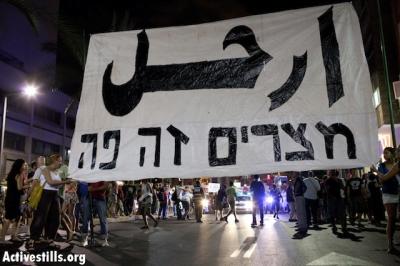
Tel Aviv protest movement: "Egypt is here!"

An estimated 300,000 marched in cities and towns across Israel Aug. 6—the biggest mobilization yet in a growing movement for economic justice. More than 200,000 marched in Tel Aviv alone—one of the largest demonstrations in the history of the Jewish state. Even after the march ended, a hardcore of several hundred protesters blocked the intersection of Rehov Kaplan and Ibn Gvirol, two of the city's main arteries, singing Jewish songs late into the night and and chanting the movement's token slogan: "The people demand social justice!" (Jerusalem Post, Aug. 7) Israel's progressive 972Mag shows a photo of a giant banner from the rally with the word "Go!" in Arabic—a key symbol of the protest movement that brought down Hosni Mubarak in Egypt, and a clear reference to Benjamin Netanyahu. Below, in Hebrew, are the words: "Egypt is here!"
The Israeli news portal YNet reports on the efforts of far-right activists, led by Baruch Marzel (in the news recently for leading an occupation of Joseph's Tomb and schmoozing with Glenn Beck), to derail the political direction of the protests with anti-immigrant scapegoating, marching with slogans such as "Tel Aviv is Jewish, Sudanese go to Sudan!" But the account also notes that the participation of Marzel and his odious followers was rejected by most of the protest leaders.
AFP notes in the headline that the movement now seeks "radical change"—but is tilting to the left, not the right. Protest leader Hadas Kushlevitch outlined a list of agreed-upon demands to the French news agency: "We demand a halt to privatisation, cuts to indirect taxes, a comprehensive programme for affordable housing and free schooling from an early age."
Haaretz even reports that the tents set up by the far-right "Hilltop Youth" in the protest encampment were burned by leftist protesters, sending them packing—and leaving them to kvetch to a reporter, "You show up only when a mosque is torched. What about this?" (Seemingly oblivious to the reality that the reporter he was talking to had, in fact, shown up.)
On the other hand, the AFP account also noted a hesitancy to embrace demands for increased taxing of the rich, or cuts to spending on the military and West Bank settlements. "At this stage we're not raising the question of financing," Kushlevitch said.
AlJazeera especially notes that protest organizers have been silent on the issue of the occupation. "Right now close to 85% of the public is in support of the demonstrations and yet the protesters still maintain the line that they are apolitical—meaning they refuse to discuss the issue of occupation," the Arab media giant quotes Israeli journalist Joseph Dana. "But the sad reality is that if Israelis discuss Palestinian rights, specifically the rights of Palestinians under Israeli occupation, they very quickly lose public support. If there is no criticism of the occupation, it would provide an absolute proof that the Israeli society is not ready or willing to discuss this occupation."
Some protesters, to their credit, are putting this assumption to the test. Dimi Reider on 972Mag offers a glimmer of hope even here:
First, a tent titled "1948" was pitched on Rothschild boulevard, housing Palestinian and Jewish activists determined to discuss Palestinian collective rights and Palestinian grievances as a legitimate part of the protests. They activists tell me the arguments are exhaustive, wild and sometimes downright strange; but unlike the ultra-right activists who tried pitching a tent calling for a Jewish Tel Aviv and hoisting homophobic signs, the 1948 tenters were not pushed out, and are fast becoming part of the fabric of this "apolitical" protest.
A few days after the 1948 tent was pitched, the council of the protests—democratically elected delegates from 40 protest camps across the country – published their list of demands, including, startlingly, two of the key social justice issues unique to the Palestinians within Israel: Sweeping recognition of unrecognised Bedouin villages in the Negev; and expanding the municipal borders of Palestinian towns and villages to allow for natural development. The demands chimed in perfectly with the initial drive of the protest – lack of affordable housing.
The expropriation of the Bedouin to make way for Jewish-only housing in the Negev is an ongoing outrage, and it is a real sign of hope that the Tel Aviv protesters have adopted this demand. Let's see if they will now go the next step and also embrace the Palestinian demand for a halt to expropriation and settlement on the West Bank—at which point, the Israeli protest movement will become truly dangerous. In a good sense.
Stay tuned.

